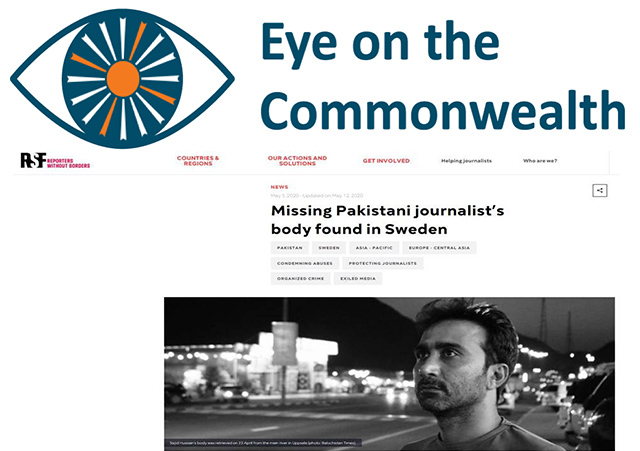 Reporters Without Borders website covering the death of Sajid Hussain.
Reporters Without Borders website covering the death of Sajid Hussain.
Many Commonwealth member states have tortured and murdered their citizens in the name of public order – the recent exposé of collusion between the British military and loyalist death squads in Northern Ireland proves that the UK is not above this, even if it used proxies. Some Commonwealth countries have pursued their critics after they fled abroad, as Rwanda apparently did when Paul Kagame’s former comrade, Patrick Karegeya, was found strangled in a South African hotel room.
But has a Commonwealth country ever felt it necessary to warn residents of threats from a fellow member state? This is what has happened in Britain as several dissidents in exile were informed by Scotland Yard that there were credible threats to their lives from the Pakistani intelligence services. According to Reporters Without Borders (RSF), ‘a list of Pakistani dissidents who are now refugees in other countries is circulating within Inter-Services Intelligence (ISI), the most powerful of Pakistan’s intelligence agencies.’
The threats to outspoken critics of Islamabad were in the spotlight in late January after a London jury returned a unanimously guilty verdict against a man accused of conspiring to murder a Pakistani dissident living in the Netherlands. The court heard that Muhammad Gohir Khan was offered £100,000 to assassinate Ahmad Waqass Goraya, a government critic, last year. The high-profile blogger told the BBC he was abducted and tortured by suspected members of the Pakistan intelligence services in 2017. He went into hiding after a warning from the Dutch police. ‘A conspiracy is not an isolated act,’ said RSF. ‘They should summon Pakistani diplomatic representatives in Europe for questioning.’ Another Pakistani exile to be warned is Ayesha Siddiqa, an academic living in London who writes about Pakistan’s military. ‘The Met’s counter-terrorism command said there was credible information of a threat to my life,’ she said.
Dissidents’ fears were heightened in 2020 when two campaigners drowned in mysterious circumstances within months of each other. Sajid Hussain, a journalist from Pakistan’s Balochistan province, had covered forced disappearances and human rights abuses in his home region, which has a longstanding independence insurgency. In 2012, three years after his uncle, a leading nationalist, was assassinated, Hussein went into exile and was given asylum in Sweden in 2019. After disappearing for two months, he was found dead in a river in Uppsala.
Also in 2020, Karima Baloch, another activist from Balochistan and a relative of Hussain, was found dead in a Toronto lake aged 37, weeks after she received anonymous threats. ‘She didn’t go abroad because she wanted to, but because… open activism in Pakistan had become impossible,’ her sister, Mahganj, told the BBC. Her husband, Hammal Haider, a British resident, said: ‘Anyone critical of the Pakistan army is a potential target.’
‘A climate of fear continues to impede media coverage of abuses by both government security forces and militant groups,’ said Human Rights Watch in its World Report 2021, published last month. It said the Pakistani government had stepped up its campaign of harassment against journalists, lawyers, civil society activists, political opponents and rights defenders. Leading female journalists have also complained of orchestrated abuse from supporters of the ruling Pakistan Tehreek-e-Insaf party (PTI), led by the prime minister, Imran Khan, whose rise to power is widely believed to have been thanks to the military.
In the months before what Foreign Affairs called ‘Pakistan’s sham election’ in 2018, another journalist, Taha Siddiqui, escaped an attempted abduction in Rawalpindi. It was the culmination of a sustained campaign of harassment and the Pakistan bureau chief of the Indian TV channel WION had finally had enough, taking his wife and child into exile in Paris. Writing in the Washington Post, he said: ‘US intelligence officials told me they believe that, after [Saudi dissident] Jamal Khashoggi’s killing, repressive regimes such as the one in Pakistan have been emboldened to silence critics, not only at home but also abroad.’
In an open letter to the head of Pakistan’s military, published in the Guardian, Siddiqui described meeting the interior minister, Ahsan Iqbal, after his own abduction and being urged to seek a pardon from the general. ‘It was then that I decided that if the highest law-enforcement officer in the land, the federal interior minister, could not help me, I was on my own, and I needed to get out to stay alive,’ he wrote. But even fleeing to Europe no longer protects one from the vengeance of the Pakistani military. Describing the harassment of his family, he said: ‘They have had multiple visits by people identifying as being from the ISI. They told my father that I should not think I am safe just because I live in France.’
However, in a brave rallying cry for all those standing up for free expression – something enshrined in the Commonwealth Charter but ignored by Pakistan’s establishment – Siddiqui said: ‘I believe powerful and independent ideas should not be given up, no matter what the cost.’ It is to be hoped he does not pay the ultimate price for that principle.
Commonwealth Update became Eye on the Commonwealth in January 2022. After 38 years in print form, the column has moved from the Round Table journal to the Round Table’s website. Originally Commonwealth Notebook, the column became Commonwealth Update in 1993. The new-look Eye on the Commonwealth will seek to provide a perspective on a topical development by the journal’s Commonwealth Update editor, Oren Gruenbaum.



